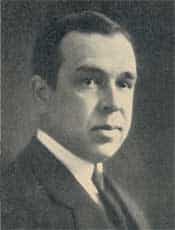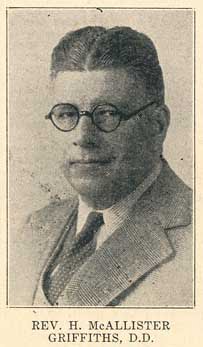This Day in Presbyterian History:
A Call to Arms
The first mass meeting and rally to challenge and encourage the conservative members in the Presbyterian Church, U.S.A. took place on October 8, 1935 at the Central North Broad Presbyterian Church in Philadelphia, Pennsylvania.
The sponsoring organization which called for this first meeting was the newly formed Presbyterian Constitutional Covenant Union. This independent organization had been formed for two purposes: (1) to reform the Presbyterian Church, U.S.A. from the inside, stopping the encroaching apostasy; (2) if that fails, to continue on a true Presbyterian church outside of the PCUSA. It was this second purpose which caused the most trouble and resulted in many who had originally supported Westminster Seminary and the Independent Board for Presbyterian Foreign Missions to become lukewarm to Dr. Machen and those associated with him. But the latter was not the case at this mass meeting as close to one thousand people came together for this first meeting.
The first speaker, as reported by Mr. Thomas Birch of the Presbyterian Guardian in their October 21st edition, was Dr. Charles Turnbull, editor of the Sunday School Times. He spent a good time of his speech showing with much evidence the growing modernism which characterized the pulpits of the land and Sunday School rooms. Challenging the Christian audience to be faithful to the Word of God, and contend earnestly for the Christian faith by supporting the newly formed institutions, like the Presbyterian Constitutional Covenant Union, Westminster Seminary, and the Independent Board for Presbyterian Foreign Missions.
 Speaking secondly was Dr. J. Gresham Machen, President of the Independent Board and professor at Westminster Seminary. Using James 1:22 at his text, which states, “But be ye doers of the word, and not hearers only, deceiving your own selves” (KJV), the stalwart of the historic Christian faith, outlined the events which led to this crisis of faith in the Presbyterian Church.
Speaking secondly was Dr. J. Gresham Machen, President of the Independent Board and professor at Westminster Seminary. Using James 1:22 at his text, which states, “But be ye doers of the word, and not hearers only, deceiving your own selves” (KJV), the stalwart of the historic Christian faith, outlined the events which led to this crisis of faith in the Presbyterian Church.
 Speaking last was the General Council of the Presbyterian Constitutional Covenant Union, the Rev. H. McAllister Griffiths. He spoke of future plans of the Union as well as the Presbyterian Guardian.
Speaking last was the General Council of the Presbyterian Constitutional Covenant Union, the Rev. H. McAllister Griffiths. He spoke of future plans of the Union as well as the Presbyterian Guardian.
The closing hymn was an apt one, in that the great crowd sang Martin Luther’s hymn, “A Mighty Fortress is our God.” Truly another Reformation was being accomplished by those gathered on that Tuesday night in Philadelphia.
Words to live by: We have the advantage of looking back and seeing history as it unfolded. Attempts to reform the Presbyterian Church from the inside went nowhere as the apostate machine simply suspended, for example, two of the three speakers at that meeting — J. Gresham Machen and H. McAllister Griffiths — from the ministry. They were joined by a number of faithful ministers who were also kicked out of the church. So a new church — the Presbyterian Church of America — was formed in 1936 at the last meeting of the Constitutional Covenant Union.
The question is really quite simple, dear reader, if you find yourself in a liberal congregation or denomination. You may think that you are holding them back from going more away from the Bible. But what influence are they having upon you? Are your biblical convictions becoming less and less important to you. Are your stands for righteousness becoming more and more distant from you? Pray about this fervently, not only for yourself, but for your family, and then acknowledge the sad truth that it is the liberal church who have left you and the faith given unto the saints. Support a Bible-believing, gospel-preaching, Great Commission-fulfilling church today with your membership.
Through the Scriptures: Ezra 5 – 7
Through the Standards: Grounds of Divorce
WCF 24:5, 6
5. “Adultery or fornication committed after a contract, being detected before marriage, gives just occasion to the innocent party to dissolve that contract. In the case of adultery after marriage, it is lawful for the innocent part to sue out a divorce, and, after the divorce, to marry another, as if the offending party were dead.”
6. “Although the corruption of man be such as is apt to study arguments unduly to put asunder those whom God has joined together in marriage; yet, nothing but adultery, or such willful desertion as can no way be remedied by the Church, or civil magistrate, is cause sufficient of dissolving the bond of marriage: wherein, a public and orderly course of proceeding is to be observed; and the persons concerned in it not left to their own wills and discretion in their own case.”
Through the Standards:
